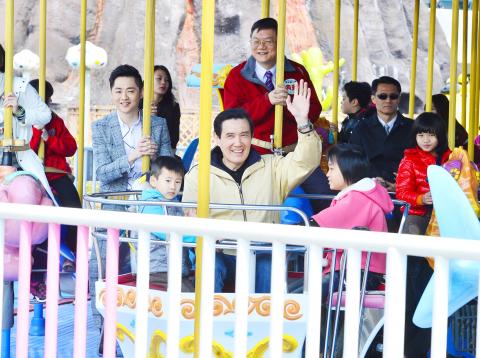President Ma Ying-jeou (馬英九) said in an interview released yesterday that both he and Chinese President Xi Jinping (習近平) are well aware that the conditions for the unification of the two sides of the Taiwan Strait are lacking at present.
In an interview with CNN reporter Christiane Amanpour, Ma said that China certainly desires unification and has never given up on the idea, according to a Chinese-language transcript released by the Presidential Office.
However, China is willing to develop relations with Taiwan peacefully on the basis of the so-called “1992 consensus” of “one China, different interpretations” because it knows that pushing for immediate unification would not achieve good results and would even have serious consequences, Ma said.

Photo: Wang Yi-sung, Taipei Times
Former Mainland Affairs Council chairman Su Chi (蘇起) admitted making up the term “1992 consensus” in 2000.
During his meeting with Xi in Singapore in November last year, he told Xi that the “one China, different interpretations” model adhered to by the Republic of China (ROC) will not be interpreted as “two Chinas,” “one China, one Taiwan,” or “Taiwanese independence,” Ma said.
“Our interpretation is of course based on our Constitution, which can only be ‘the Republic of China,’” he said, adding that the model has provided an appropriate and mutually acceptable basis for cross-strait relations over the past eight years.
When asked to reflect on why the Chinese Nationalist Party (KMT) lost the Jan. 16 elections and whether he read the election results as a backlash against his China policy and cross-strait trade pacts, Ma said that while there are people in Taiwan opposed to his China policy, they only account for a small proportion, not a majority.
“We all understand that over the past eight years of my presidency, we have created a status quo, and this status quo has won the support of the majority,” he said.
When asked how Xi interpreted the election results and how he views president-elect Tsai Ing-wen (蔡英文), who “potentially has a slightly different view when it comes to relations with China,” Ma said Xi over the past year stressed on several occasions that “the 1992 consensus is the key.”
“Of course we hope that my successor will think carefully about supporting the 1992 consensus, allowing cross-strait ties to move ahead smoothly, so when Taiwan tries to develop its international relations, we can face a more friendly environment,” Ma said.
“I believe that the people of Taiwan support a free and democratic political system, and hope that the ROC will continue to become more free and democratic,” Ma said when asked about the younger generation in Taiwan, who might feel more nationalistic, preferring a full-blown democracy.”
“However, when we develop relations with China, we have to establish a mutually accepted consensus so that this relationship will move ahead peacefully and smoothly,” Ma said.
When asked about Itu Aba Island (Taiping Island, 太平島), Ma said the ROC recovered the island in 1946 and at the time, Vietnam and the Philippines did not express any opinion.
In 1956, Taiwan began stationing troops there, and has done so till now, he said, adding: “We have been in control of Taiping Island for 60 years.”

Taiwan is stepping up plans to create self-sufficient supply chains for combat drones and increase foreign orders from the US to counter China’s numerical superiority, a defense official said on Saturday. Commenting on condition of anonymity, the official said the nation’s armed forces are in agreement with US Admiral Samuel Paparo’s assessment that Taiwan’s military must be prepared to turn the nation’s waters into a “hellscape” for the Chinese People’s Liberation Army (PLA). Paparo, the commander of the US Indo-Pacific Command, reiterated the concept during a Congressional hearing in Washington on Wednesday. He first coined the term in a security conference last

A magnitude 4.3 earthquake struck eastern Taiwan's Hualien County at 8:31am today, according to the Central Weather Administration (CWA). The epicenter of the temblor was located in Hualien County, about 70.3 kilometers south southwest of Hualien County Hall, at a depth of 23.2km, according to the administration. There were no immediate reports of damage resulting from the quake. The earthquake's intensity, which gauges the actual effect of a temblor, was highest in Taitung County, where it measured 3 on Taiwan's 7-tier intensity scale. The quake also measured an intensity of 2 in Hualien and Nantou counties, the CWA said.

The Overseas Community Affairs Council (OCAC) yesterday announced a fundraising campaign to support survivors of the magnitude 7.7 earthquake that struck Myanmar on March 28, with two prayer events scheduled in Taipei and Taichung later this week. “While initial rescue operations have concluded [in Myanmar], many survivors are now facing increasingly difficult living conditions,” OCAC Minister Hsu Chia-ching (徐佳青) told a news conference in Taipei. The fundraising campaign, which runs through May 31, is focused on supporting the reconstruction of damaged overseas compatriot schools, assisting students from Myanmar in Taiwan, and providing essential items, such as drinking water, food and medical supplies,

New Party Deputy Secretary-General You Chih-pin (游智彬) this morning went to the National Immigration Agency (NIA) to “turn himself in” after being notified that he had failed to provide proof of having renounced his Chinese household registration. He was one of more than 10,000 naturalized Taiwanese citizens from China who were informed by the NIA that their Taiwanese citizenship might be revoked if they fail to provide the proof in three months, people familiar with the matter said. You said he has proof that he had renounced his Chinese household registration and demanded the NIA provide proof that he still had Chinese